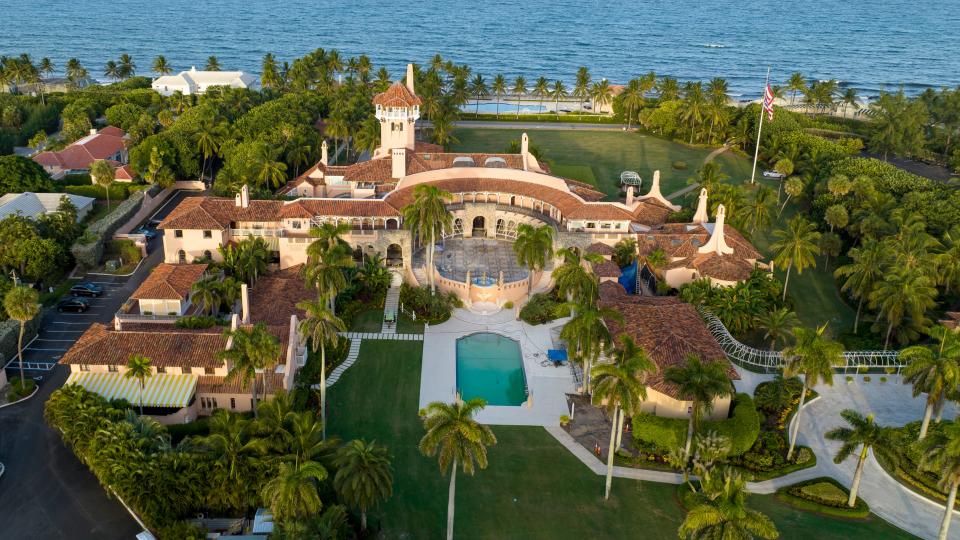Trump claims Mar-a-Lago documents were 'declassified.' Why experts reject that argument.
WASHINGTON — Former President Donald Trump claimed Friday that any sensitive documents FBI agents took during a search at his Mar-a-Lago property in Palm Beach, Florida, were "all declassified."
But experts said constitutional powers authorizing a president to declassify documents don't apply to records classified as top-secret or higher, as the information contained in them is usually protected by other federal laws designed to make sure it never falls into the wrong hands.
"Even if, in fact, what he represents has taken place, there still can be exceedingly sensitive information that is required by law to be protected from unauthorized disclosure," said J. William Leonard, the former head of the U.S. National Archives’ Information Security Oversight Office.
Leonard said this includes information on nuclear weapons technology, covert operations, spying and military sources and methods and other government secrets.
"Information within those categories, irrespective of what a president might say or do, still requires protection in the interest of national security," he said.
More: Live updates: DOJ search warrant shows Trump being probed in connection with espionage statutes

Federal authorities sought a range of highly sensitive documents, including 11 caches of classified materials, to investigate potential crimes associated with the Espionage Act, obstruction of justice and the unlawful removal of government materials, according to a search warrant unsealed by a federal magistrate in Florida.
"It was all declassified," Trump said in a statement Friday, setting up a potential legal argument that the former president could make in court.
The boxes taken from Mar-a-Lago included documents labeled "secret," "top secret" and "confidential." It also retrieved "classified/TS/SCI documents," an abbreviation for "top secret/sensitive compartmented information."
Most classified information becomes declassified automatically over time, often after 25 years. Any individual can request a review of classified information for declassification with the National Archives.
Information should be declassified or downgraded as soon as national security concerns permit, according to federal statute. The federal agencies that classified the documents have review processes before declassifying – but a president isn't subject to it.
Steven Aftergood, secrecy specialist with the Federation of American Scientists, said the president's authority to classify and declassify documents is rooted in his constitutional status as commander in chief.
What is the Espionage Act?: What to know, from the Sedition Act amendment to declassified documents.
More: Read the FBI's search warrant for Donald Trump's Mar-a-Lago property
However, whether Trump's documents are classified or declassified could be irrelevant with one of the three potential crimes.
The Espionage Act refers to "national defense information," not "classified information," Aftergood said.
"So, unauthorized disclosure even of defense information that is technically unclassified can be subject to prosecution if it is otherwise protected by the government," he said.
Trump has not said when he took action to declassify the documents, though it's assumed he means before leaving the White House in 2021. A former president lacks the same authorities as a sitting president.
More: The search warrant for Trump's Mar-a-Lago home has been released. Here's what it says.
Barbara McQuade, a former federal prosecutor, said Trump's claim that he declassified the documents could be used to negate an allegation that he willfully violated the law.
"If he believed, even incorrectly, that he could declassify documents, then the government might be unable to prove that he knew he was violating the law by possessing them," McQuade said.
According to the warrant, agents searched locations, including a room designated as the "45 Office, all storage rooms, and all other rooms or areas within the premises used or available to be used” by the former president and his staff.
Other items included on a receipt provided to Trump and his attorneys, listing the material removed, included references to a document related to the 2020 clemency granted to longtime adviser Roger Stone, a line item referencing the “President of France” and other seizures: two binders of undesignated photographs and a “handwritten note.”
Contributing: David Jackson
Reach Joey Garrison on Twitter @joeygarrison.
This article originally appeared on USA TODAY: Trump says Mar-a-Lago documents were 'declassified.' Is that true?

 Yahoo Movies
Yahoo Movies 